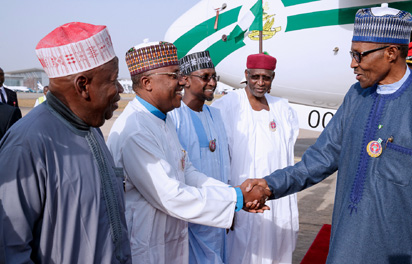News
Buhari Returns Home From France
President Muhammadu Buhari has returned to Abuja after participating at the “One Planet” summit in Paris, France. He departed on Monday.
The president’s aircraft landed at the Nnamdi Azikiwe International Airport (NAIA), Abuja, at about 4:35 p.m. where he was received by senior government officials including his Chief of Staff, Alhaji Abba Kyari and the Minister of the Federal Capital Territory, Alhaji Musa Bello.
While in Paris, President Buhari appealed to the international community to support Nigeria’s commitment to reduce the negative effects of climate change.
Buhari told participants that Nigeria could not implement its Nationally Determined Contributions without adequate financial, technical and capacity building support from developed nations
He said Nigeria ratified the Paris Agreement in May 2017 but its Nationally Determined Contributions to reduce emission by 20 per cent by 2020 and 40 per cent by 2030 could not be attained alone.
According to him, the country is not under illusion of the challenges it is facing, having just come out of recession.
The summit with the theme “Climate Change Financing’’, was attended by over 60 heads of state and governments, as well as representatives of non-governmental and private organisations.
President Buhari signed the Paris Climate Agreement on the sidelines of the United Nations General Assembly (UNGA) in New York on September 22, 2016, and followed this up with the signing of the Instrument of Ratification at the State House, Abuja, on March 28, 2017. This ratification made Nigeria the 146th party to the Paris Agreement. The Agreement became binding on Nigeria with effect from June 15, 2017, one month after the submission of the Ratification Instrument to the United Nations on May 16, 2017.
Under the Agreement Nigeria has committed (the so-called ‘Intended Nationally Determined Contributions – INDCs) to reducing carbon emissions 20% unconditionally and 45% with international support, by 2030. To achieve this Nigeria requires billions of dollars in funding and investment for energy, transport and agriculture projects that would reduce carbon emissions and mitigate the effects of climate change (manifesting as desertification, flooding, erosion, erratic rainfall, etc).
Nigeria has prioritized five sectors for the implementation of its INDCs. Among these is Oil and Gas, under which Nigeria shall strive through a new National Gas Policy that will reduce flaring, and also promote the use of gas instead of wood products.
Nigeria also proposes to pursue climate-smart agriculture, though the country is paying greater attention to agriculture to diversify the economy.
Government also planned to reduce fossil fuel burning by shifting from road transport to rail and also promote the use of renewable energy via investment in solar and wind energy.
Government cannot singlehandedly fund the implementation of the INDC targets. An estimated 80% of the funding for climate action will need to come from the private sector.
This is why the Government of Nigeria is launching, this month, a Green Bond, to raise domestic financing for low-carbon infrastructure projects across the country.
The One Planet Summit was hosted by the President of France, Emmanuel Macron, and organised by the United Nations, the World Bank Group, the French Government and a coalition of NGOs/CSOs.
Follow us on social media:-

 Celebrity Gossip & Gist1 day ago
Celebrity Gossip & Gist1 day agoMoment stage collapses on Odumodublvck during concert performance (Video)
-

 Economy1 day ago
Economy1 day agoPresident Tinubu cancels Lagos engagements in honor of food stampede victims
-

 Celebrity Gossip & Gist1 day ago
Celebrity Gossip & Gist1 day ago“The quality of a woman isn’t measured by the hair on her head but by her brain” – Yul Edochie cautions ladies against killing themselves over expensive hair this Christmas



